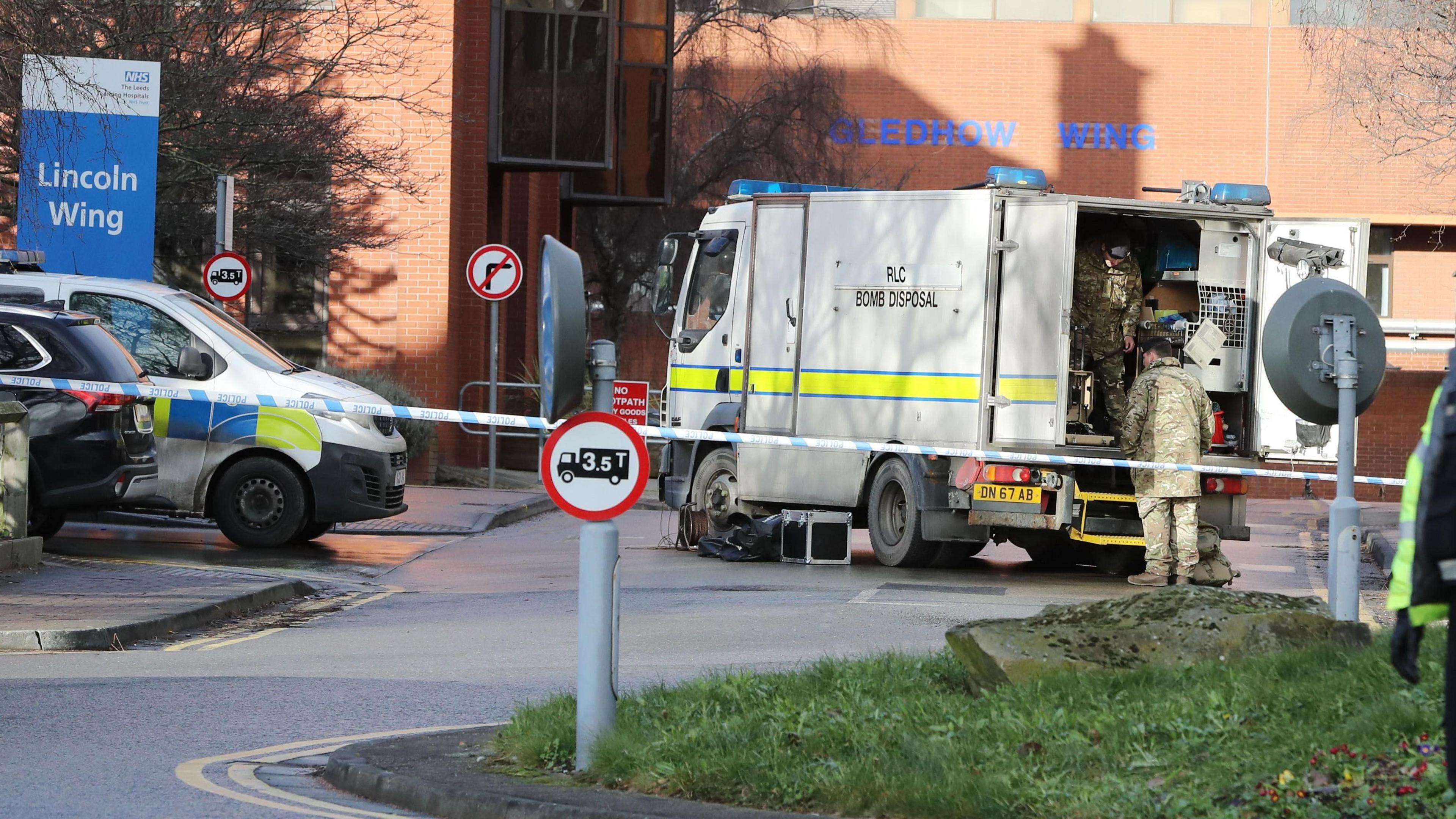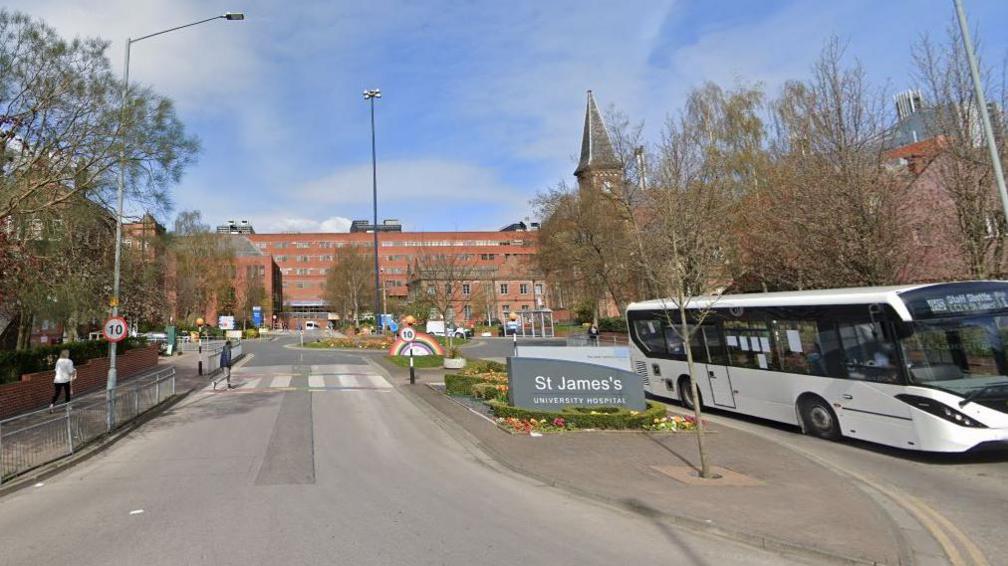Hospital bomb accused was 'lone wolf', court hears

Mr Farooq was arrested outside St James's Hospital in Leeds on 20 January 2023
- Published
A man who was stopped by a member of the public from detonating a bomb outside a hospital has been described in court as a "self-radicalised lone wolf terrorist".
Mohammad Farooq, 28, planned to "kill as many nurses as possible" at St James's Hospital in Leeds in January 2023, prosecutors told a jury at the start of his trial at Sheffield Crown Court on Monday.
Mr Farooq denies preparing acts of terrorism, but he has pleaded guilty to firearms offences and possessing an explosive substance with intent.
He has also pleaded guilty to having a document likely to be useful to a person preparing or committing an act of terrorism.
On the first day of his trial, jurors were told that Mr Farooq was arrested with a pressure cooker bomb outside the Gledhow Wing of the hospital in the early hours of 20 January 2023.
Prosecutors said he had planned to "seek his own martyrdom" through a "murderous terrorist attack" by detonating the bomb.
He then aimed to kill as many people as possible with knives before using an imitation firearm to incite police to shoot him dead, jurors heard.
Prosecutor Jonathan Sandiford KC told the court that Mr Farooq had immersed himself in an "extremist Islamic ideology" after becoming self-radicalised by accessing extremist material and propaganda online.
The jury was told that he had obtained bomb-making instructions in a magazine published by al Qaida, and his first plan had been to attack RAF Menwith Hill, a spy base near Harrogate which is operated by US and UK staff.
Mr Sandiford said: "When he thought that was not possible, his 'plan B' was to attack St James's Hospital, a softer and less well-protected target than a military base."
Mr Farooq was previously a clinical support worker at the hospital and his "secondary motive" was a grievance against several of his former colleagues, Mr Sandiford added.
'Luck intervened'
The prosecutor told the court that "two pieces of good fortune intervened" to stop the hospital attack.
Mr Sandiford said the first was that a bomb threat Mr Farooq had texted to an off-duty nurse in order to lure people to the car park where he was waiting with the bomb was not seen for almost an hour.
That meant the full-scale evacuation Mr Farooq had hoped for did not happen, he said.
The prosecutor said Mr Farooq then left, but returned shortly afterwards with a new plan to wait in a hospital cafe for a staff shift change when he would detonate his device, "killing as many nurses as possible".
But "luck intervened again" when Nathan Newby, a patient, noticed the defendant outside the hospital and struck up a conversation.
"Mr Newby realised something was amiss and began to talk to him instead of walking away," said Mr Sandiford.
"That simple act of kindness almost certainly saved many lives that night because, as the defendant was later to tell the police officers who arrested him, Mr Newby succeeded in 'talking him down'."
Mr Sandiford said the defendant told Mr Newby about his plan to take the bomb into the hospital and "kill as many nurses as possible".
"Mr Newby stayed with the defendant, keeping him engaged and calm," he added.
"Mr Newby also persuaded the defendant to move away from the main entrance to a seating area so the IED was as far away from the building as it was possible to go."
Jurors heard Mr Farooq then handed his phone over to Mr Newby to ring the police.

Mohammad Farooq planned to "kill as many nurses as possible" at St James's Hospital in Leeds, the court was told
Mr Farooq was subsequently arrested by officers, who found the "viable" pressure cooker bomb contained just under 10kg of low explosive, the court heard.
He later told police his device was intended to be twice as powerful as that used by the Boston Marathon bombers in 2013.
Mr Farooq also had two knives, black tape and a blank-firing imitation firearm in his possession.
Mr Sandiford said RAF Menwith Hill had been designated as a target by so-called Islamic State because it was believed the base had been used to co-ordinate drone strikes against terrorists.
Jurors at Sheffield Crown Court were told that Mr Farooq made at least two visits to the site in the 10 days leading up to his arrest.
Mr Sandiford said the defendant admitted intending to attack St James Hospital, but denied intending to attack the RAF base.
In his interviews with police, Mr Farooq said he had taken the bomb with him to Menwith Hill on 10 January and 18 January but said he had "no terrorist intention" and had travelled there because he liked to drive around that area of North Yorkshire.
In his short opening remarks to jurors, Gul Nawaz Hussain KC, representing Mr Farooq, said the defendant was not radicalised and that his actions were due to a "deep rooted yet unjustifiable anger and grievance towards those he worked with".
The trial continues.
Follow BBC Yorkshire on Facebook, external, X (formerly Twitter), external and Instagram, external. Send your story ideas to yorkslincs.news@bbc.co.uk, external.